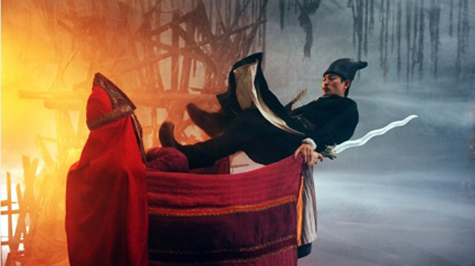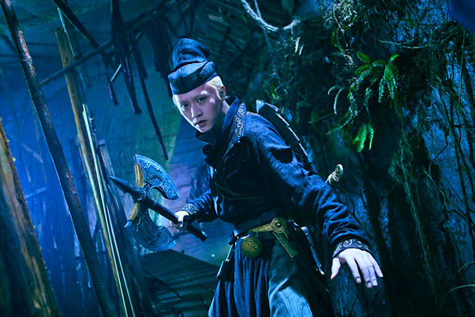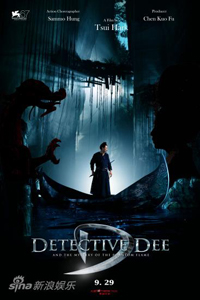During the Tribeca Film Festival, I managed to catch a showing of Detective Dee and the Mystery of the Phantom Flame. Watching the preview, this film promised big set pieces, lots of fiery explosions, and awesome martial arts action. A film that has Chinese alternate history and features a detective worthy of Sherlock, a black market underground beneath the Forbidden City, and a plot involving the mechanics of building a 800-foot tall Buddha—it all sounds pretty steampunk-esque. When a post about it went up on Tor.com Steampunk, people scratched their heads about whether it would qualify, or if, yet again, a fad word had been plopped in by marketing.
I think it’s steampunk in the way James Ng’s art is, the way Shweta Narayan’s “Eyes of the Craven Emerald” is, the way that Yakoub Islam plans to write a Muslim steampunk story set in the twelfth century, and the way that Aether Age plays with the concept of highly industrialized ancient civilizations. So for any nay-sayers who are not calling this steampunk, then I suppose these don’t qualify either. But examining how technology can—and has—developed independently from Western influence is an idea that shouldn’t mark something as not being steampunk.
But enough squabbling about labels, because in the end, this is one kick-ass entertaining film in its own right.
Tsui Hark’s Detective Dee and the Mystery of the Phantom Flame starts with a bang—or, well, a spontaneous combustion sort of bang. It’s the year 690, and Empress Regent Wu, the only woman to ever claim the Chinese throne, is about to be inaugurated as Empress. The only thing stopping the ceremony is the string of people who go up in flames while working on the benevolent giant Buddha statue made for the event. People take this as an inauspicious sign, of course. In a court where a woman in power has garnered a lot of enemies, the Empress wants to quell fears of divine disapproval by hiring someone who already disapproved of her to solve the murders: Detective Dee (Andy Lau). He’d been imprisoned by her years before for leading a rebellion against her regent rule, but she gives him his freedom in exchange for catching the culprit—and indirectly proving the legitimacy of her rule. Talk about complex politics, eh?

The detective is aided by two officials who are equally determined to solve the case: a hard-nosed and impulsive albino police officer Pei Douglai (Chao Deng) and the stern and secretive Shagguan Jing’er (BingBing Li), head of Empress Wu’s personal bodyguard. I loved the little touches that add to their characters: Douglai has a lackey that follows him with an umbrella to shield him from the sun, as he shakes down witnesses and takes names. Jing’er is no-nonsense and unquestionably as tough as the woman she serves, even when it comes to her attempts at seducing Detective Dee. The detective himself, played by the masterful Andy Lau, carries the role of an honor-bound detective very well.

Carina Lau, however, gets props from me as the best actress in this film. Empress Wu has gotten bad rap for overstepping her bounds by misogynist record-keepers throughout history, but this film balances her no-holds-barred ambition with her inner strength needed to fight for power in a patriarchal society. In Detective Dee, she acts manipulative and makes brutal sacrifices, but Carina Lau gives a compelling performance that by turns show the empress as both sympathetic and cold-hearted. With the luggage on this historical figure’s shoulders, Lau’s portrayal of Empress Wu does not cheapen the complexity of her character. The last scene between her and Detective Dee is particularly tense and does justice to them both as characters who hold each other in high regard—even if plays lightly on the actual history of the real Empress Wu’s fate.
The film itself is a spectacle to behold, full of vibrant, colorful scenes and high-impact action sequences that only the best kung-fu movies can bring. Things blow up, animals talk, and the settings and costumes throughout are gorgeously lush, brilliant, and breath-taking. The pacing of the plot also grabs by the throat and didn’t let go for its two-hour run time. Overall, this is a very satisfying film, and would be the perfect summer action flick. Hopefully, Detective Dee will make its stateside DVD appearance soon.
Ay-leen the Peacemaker is the founding editor of the multicultural steampunk blog Beyond Victoriana. She may or may not moonlight as a subversive kung-fu master.










